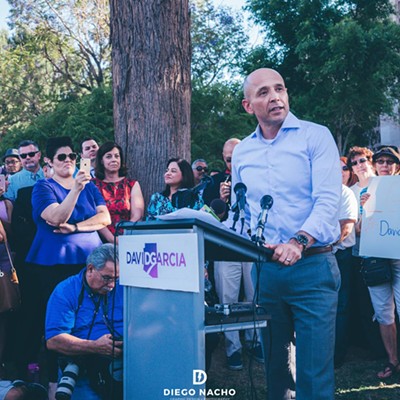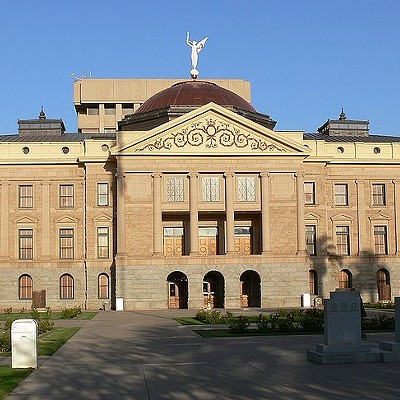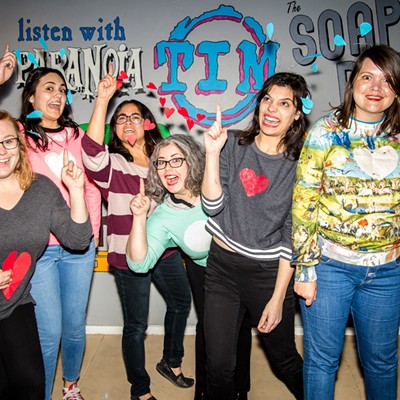During a recent tour with new YWCA Tucson executive director Kelly Fryer of the organization's Bonita Street headquarters, there's a lot of "picture this" and "imagine that."
Seven months into her new post, Fryer says the organization is making changes to make sure that after 100 years the agency remains relevant to the community and creates programs that are sustainable to survive another 100 years.
Some of the programming remains the same, including the computer room lined with PCs for women involved in the YWCA's employment and life skills classes. There's still My Sister's Closet, which provides professional clothing to women for job interviews and reentering the workplace. Fryer says the program, into its 26th year, has helped more than 30,000 Tucson-area women dress for their first job interview.
Prior to Arizona, Fryer says she worked as a Lutheran pastor in Chicago for more than 15 years, primarily doing turn-around ministry to help struggling churches grow.
At the YWCA, Fryer says the agency remains strong, but the planning going on right now is all about the "picture this" and "imagine that," and making sure the YWCA continues to grow.
That's when Fryer introduces Liane Hernandez who moved to Tucson to work as a sous chef at the new downtown eatery Proper. However, Fryer had an idea to create a cafe in the YWCA space, as well as healthy living programming for youth and the community, and eventually a garden.
The day of the tour, Hernandez is getting ready to drive up to Phoenix to pick up a coffee cart that's expected to be the center-piece in the organization's lobby by early October.
"This was an opportunity I couldn't resist," Hernandez says.
Hernandez says she always wanted to work with youth, especially girls, on food, nutrition and gardening, and the cafe is one way to help make that happen. Fryer says another objective of the cafe is to bring people into the building to create a community center where people feel comfortable gathering.
"We want to create a sense of community," Fryer says. Besides offering coffee and food, there will also be wifi so people can hang out and work.
On the north side of the building will be what Fryer calls the Galleria, a hallway with a large wall space that leads to several conference rooms that will be transformed into an art gallery showcasing Tucson women artists and the building's courtyard will host a community concert series. In March, one of those conference rooms off the gallery space will be transformed into a Southern Arizona women's history exhibit.
Other new projects Fryer is excited about include workshops on the Affordable Care Act and on the first Saturday of May, a women's festival is in the works that the Southern Arizona Arts and Culture Alliance is helping with.
Of course, the organization's mission—eliminating racism and empowering women—remain the YWCA's focus in its programming. The Yworks is a continuing economic-empowerment program that offers career building and finance workshops in English and in Spanish. The Happy Organization—started by 12-year-old Haile Thomas, that works with elementary-aged youth on physical activities, nutrition and healthy cooking—has found a home at the YWCA, and in-turn the YWCA is helping Thomas with the work needed to start an organization, create a budget and apply for grants.
Another program called Mi Carrera, My Career, is a project to help Spanish-speaking women succeed from job skills to career and employment search. But one project that Fryer is particularly impressed with is Lider de Mi Vida, a leadership program particularly for Spanish-speaking immigrant women. Funding for the program ended this year, she says, but the women who went through the first class have asked if they can help it continue by mentoring and working with a new group of women.
Fryer says what most people may not know is the YWCA's success rate in its employment and job skills classes is 90 percent. The numbers tracked by the YWCA also show that women who go through these programs contribute $7 million into Tucson's economy.
YWCA board member Greg Hart, retired Pima Community College adult education director, happened to stop by at the end of the tour. He says he's particularly excited about the direction Fryer and her staff are taking the organization right now determining next steps that are needed to help the nonprofit survive in an economy that isn't being so kind to nonprofits lately.
"We were looking for a dynamic personality to take this on," Hart says about Fryer.
Hart says the days of traditional and reliable funding sources for nonprofits are over, and while during Janet Marcotte's 25 years at the organization were successful, it was obvious to the board of directors that as funding began to decrease, from government sources in particular, the agency needed whoever was going to take her place to think more out of the box.
Creating a space for people to gather and even organize is another goal Fryer has as the vision for the cafe continues. Recently, Fryer says it began with something so simple as bringing together Tucson women restaurant owners for a happy hour that they want to make a regular event.
"About 20 women came with wine, food and lemonade," Fryer says.
Bringing different facets of the community to gather and having important conversation that can lead to solutions is what she wants to see happen. At the end of the restaurant-owner happy hour was the idea of creating a cooperative that could help members purchase green cleaning supplies that are often too costly on their own.
Overall it's about creating a new nonprofit model that's different from most YWCA's across the country. Fryer says part of it is creating a membership fee and fee-based programs, focusing on individual philanthropy and creating programs that can help bring in income, like the cafe, as well as programs that continue to be mission driven.













